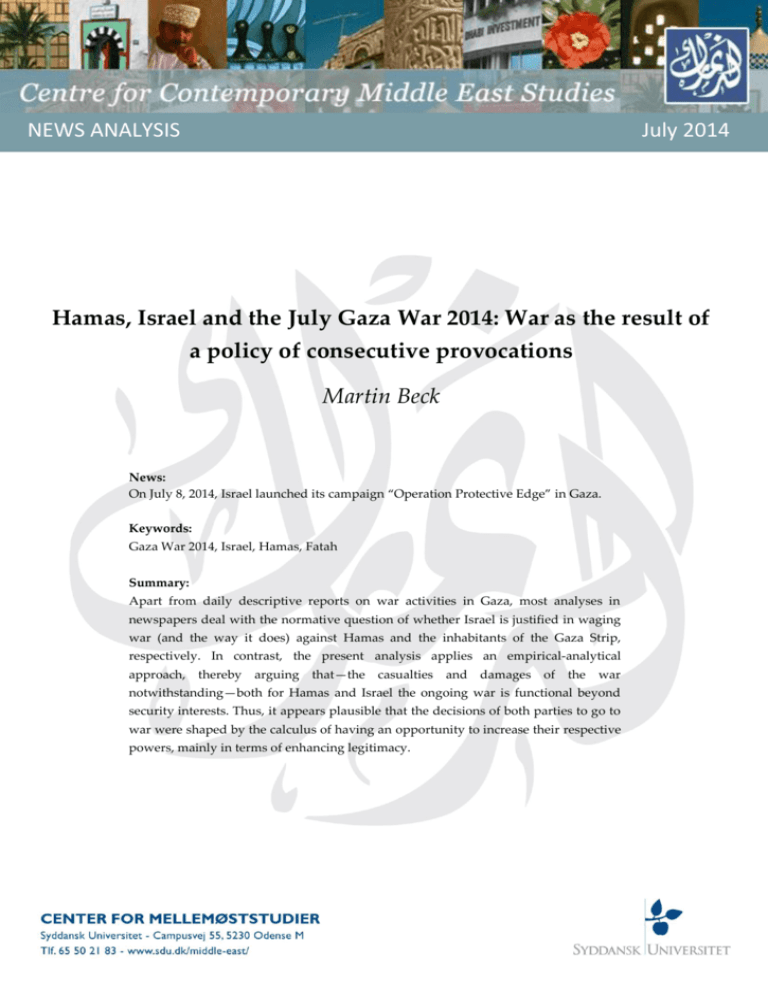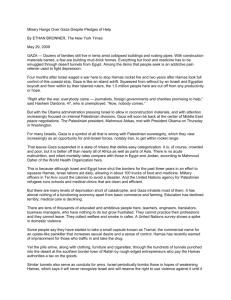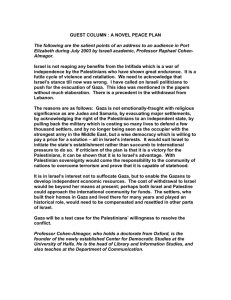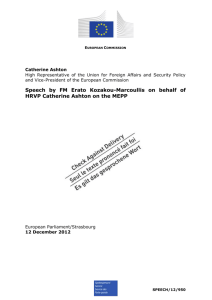Hamas, Israel and the July Gaza War 2014: War as the result of a
advertisement

NEWS ANALYSIS July 2014 Hamas, Israel and the July Gaza War 2014: War as the result of a policy of consecutive provocations Martin Beck News: On July 8, 2014, Israel launched its campaign “Operation Protective Edge” in Gaza. Keywords: Gaza War 2014, Israel, Hamas, Fatah Summary: Apart from daily descriptive reports on war activities in Gaza, most analyses in newspapers deal with the normative question of whether Israel is justified in waging war (and the way it does) against Hamas and the inhabitants of the Gaza Strip, respectively. In contrast, the present analysis applies an empirical-analytical approach, thereby arguing that—the casualties and damages of the war notwithstanding—both for Hamas and Israel the ongoing war is functional beyond security interests. Thus, it appears plausible that the decisions of both parties to go to war were shaped by the calculus of having an opportunity to increase their respective powers, mainly in terms of enhancing legitimacy. Martin Beck: Hamas, Israel and the July Gaza War 2014: War as the result of a policy of consecutive provocations Analysis: The starting point of the present analysis is the question why Hamas provoked Israel to wage war on the Gaza Strip by firing rockets: The leadership of the organization was aware that its policy could very well provoke an Israeli military campaign.1 Moreover, there can be no doubt that Hamas knew that it would not have any chance to win a war against one of the most sophisticated armies worldwide and that Palestinians would pay a high price in terms of human casualties and damages of military and civilian infrastructure. Thus, the question arises: Why did Hamas provoke Israel to wage war? Did it act irrationally? Was its behavior an outcome of stubborn fanatism as it is sometimes presented in the mass media? In contrast, the argument of the present short article is that Hamas in the period before July 2014 got increasingly pressured to act; at the same time, alternative options became less attractive or simply eliminated up to the degree that Hamas threw caution to the wind and risked a military conflict with Israel with which it aimed at increasing its domestic legitimacy both in Gaza and the West Bank including East Jerusalem. Since Israel was actively involved in shrinking the options of Hamas prior to the July 2014 campaign, it appears appropriate to assume that Israel was aware that Hamas was running out of alternative options to resuming violence against Israel, possibly even pushing Hamas into the direction of attacking Israel with rockets in order to increase its legitimacy of maintaining its occupation on Palestine. When the late Israeli Prime Minister Ariel Sharon launched his unilateral “disengagement” plan for the Gaza Strip in 2005, mobility of goods and persons on all levels (on land, at sea and in air) remained largely under Israeli control. Thus, Israeli overall dominance over Gaza whose economy is extremely dependent on imports has been a structural reality long before actual controls were tightened up to a fully-fledged blockade, which was introduced by a Western-backed Israeli response to Hamas’s takeover of power in the Gaza 1 Jeroen Gunning: What drove Hamas to take on Israel?, BBC, July 18, 2014, available at: http://www.bbc.com/news/world-middle-east-28371966. 2 Martin Beck: Hamas, Israel and the July Gaza War 2014: War as the result of a policy of consecutive provocations Strip in 2007. Although officially targeting Hamas, de facto the main party affected is the civilian population of Gaza. Contrary to the expectations of quite a few observers, Hamas managed to maintain its rule in Gaza despite the grim economic effects of the blockade. Why so? Hamas proved to be quite adaptive to the pressure, particularly by digging tunnels through which—despite its imposed primitiveness and dangerous working conditions—nearly all kinds of goods could informally be imported to and exported from the Gaza Strip. The tunnels not only became the infrastructural backbone of the private economy but also provided Hamas— through a bureaucratized customs regime—with a major source of revenue.2 At the same time, Israel frequently agreed to some easing of the mobility restrictions. Even more important was the fact that Israel tolerated Gaza’s tunnel economy for extended periods—before restrictions got tightened up again and tunnels were destroyed through military strikes. In the period prior to “Operation Protective Edge,” Hamas was exposed to a situation in which its chances to partially bypass the blockade imposed by Israel were significantly curtailed. This was partially caused by the Egyptian military coup in July 2013 and Cairo’s subsequent policy alterations. When the Muslim Brotherhood won all free post-Arab Spring elections in Egypt and provided the President, Hamas’s hopes went high that an opening of the Gaza-Egypt border in Rafah would let fulminate most of the negative effects of the Israeli blockade. Although Hamas historically is an offspring of the Muslim Brotherhood, these high hopes were frustrated. Rather, strict border controls, particularly in terms of goods, between Gaza and Egypt as established under Egyptian President Hosni Mubarak remained basically intact. Still, General Abdel Fattah el-Sisi’s seizure of power in July 2013 caused the situation for Hamas to heavily deteriorate. Sisi banned Hamas in Egypt and stopped the policy of tolerance towards tunnels that Hamas had dug towards the Egyptian Sinai Peninsula.3 Together with a tightening up of the Israeli blockade policy, the Gaza Strip experienced a severe economic and humanitarian crisis throughout 2014. Already in November 2013, Commissioner General of the United Nations Relief 2 Nicolas Pelham: Gaza’s tunnel phenomenon. The unintended dynamics of Israel’s siege, Journal of Palestine Studies 41 (4), 2012, p. 6. 3 Eric Trager: Sisi’s Egypt and the Gaza conflict, The Washington Institute for Near East Policy, July 14, 2014, available at: http://www.washingtoninstitute.org/policy-analysis/view/sisis-egypt-and-the-gazaconflict; Unispal: Special Focus. Gaza Strip, February 2014, available at: http://unispal.un.org/UNISPAL.NSF/0/E69044C1FD5BD1E485257C770050C8C2. 3 Martin Beck: Hamas, Israel and the July Gaza War 2014: War as the result of a policy of consecutive provocations and Work Agency for Palestine Refugees had warned that the Gaza Strip was quickly becoming “inhabitable.”4 Thus, Hamas was under major pressure to renew the legitimacy of its rule, particularly when, as a result of the loss of revenue from the tunnel economy, they could not even pay full salaries to the employees of the public sector, which is the most important employer in the Gaza Strip.5 Pressured in this way, Hamas signed a reconciliation agreement with Fatah on April 23, 2014, thereby agreeing to build a national unity government. This was a remarkable step not only because all previous attempts of reconciliation talks between Fatah and Hamas that the two Palestinian parties had been engaged with since 2007 sooner or later failed. In addition, Hamas was willing to back a government which, when sworn in by the President of the West Bank-based Palestinian Authority, Mahmud Abbas, officially accepted three major demands of the West: recognition of Israel, respect for past agreements, and renunciation of violence.6 However, Hamas’s hope that the creation of a new Palestinian unity government could solve at least some of the problems of Hamas, scattered rapidly. First and foremost, Israel strongly disapproved the building of the new government and even used it as an argument to suspend American sponsored peace talks with Mahmud Abbas.7 The reaction of Israel destroyed Hamas’s hope that Israel could grant facilities to the inhabitants of the Gaza Strip in exchange for its political move of subordinating itself to a government whose principle was based on Fatah’s rather than Hamas’s concepts. To make things worse from the perspective of Hamas, Fatah proved to be a tough bargainer. For instance, the Palestinian Authority based in Ramallah refused to transfer funds to pay the salaries of the Hamas-run public sector.8 4 UN Official: Gaza is quickly becoming “uninhabitable,” Middle East Monitor, November 21, 2013, available at: https://www.middleeastmonitor.com/news/europe/8422-un-official-gaza-is-quicklybecoming-uninhabitable. 5 Rasha Abou Jalal: Hamas sinks in polls after cutting salaries to public servants, Al Monitor, February 20, 2014, available at: http://www.al-monitor.com/pulse/originals/2014/02/hamas-gaza-salariespayments-siege.html#. 6 Joel Greenberg: Abbas swears in Palestinian unity government, Financial Times, June 2, 2014, available at: http://www.ft.com/cms/s/0/e19e896c-ea69-11e3-80fb-00144feabdc0.html#axzz38TId47pQ. 7 Jodi Rudoren: Israel halts talks, citing Palestinian unity agreement, New York Times, April 24, 2014, available at: http://www.nytimes.com/2014/04/25/world/middleeast/israel.html?_r=0. 8 Gaza public servants strike over pay dispute, Aljazeera, June 27, 2014, available at: http://www.aljazeera.com/news/middleeast/2014/06/gaza-public-servants-strike-over-pay-dispute2014626162613667541.html. 4 Martin Beck: Hamas, Israel and the July Gaza War 2014: War as the result of a policy of consecutive provocations When deprived of all promising “civilized” options, those factions of Hamas that are opposed to (even temporarily) accommodate itself with Israel got the upper hand in the organization.9 In a situation in which no non-violent strategy was promising to generate any substantial benefit, risking a military dispute with Israel appeared, albeit still dairy and costly, a convincing alternative to power-oriented Hamas politicians. Hamas was in a pressure situation in which an increasingly desperate population expected from its political leadership to do something. In other words, Hamas was in a typical bias toward action situation—with not many options left to do anything beyond provoking a military conflict with Israel (except surrender). Moreover, despite its military inferiority vis-à-vis Israel, Hamas had some reason to calculate that a military conflict with Israel could increase its legitimacy among Palestinians, thereby also strengthening Hamas in its competitive relationship with Fatah. There is some evidence that Hamas actually succeeded in this respect, particularly in the West Bank. Many Palestinians viewed Israel rather than Hamas as responsible for the war hardships—not least because, as Hamas correctly anticipated, Israel, like in previous wars, would choose a warfare strategy that would cause hundreds of casualties among Gaza civilians.10 To many Palestinians, Hamas appeared as an organization that at least did “something” against the occupation, whereas Fatah closely collaborated with the Israeli Defense Forces (IDF). For West Bankers it was at the same time easier to approve the strategy of Hamas because they would not have to personally endure the grim hardships of a military conflict with Israel. The fact that Hamas provoked a military conflict with Israel can be comprehended as the outcome of a stress situation: On the one hand, due to a desperate economic situation of the inhabitants of the Gaza Strip and shrinking financial leeway, Hamas was under major pressure to act; on the other hand, Hamas had been deprived of most non-violent viable options. In this situation, Hamas’s risk aversion got very low. At the same time, there are few if any doubts that Israel was well aware of the strategic situation of Hamas before July 9 Jeroen Gunning: What drove Hamas to take on Israel? (Footnote 1). Jeroen Gunning: What Drove Hamas to Take on Israel? (Footnote 1); David Pollock: Hamas in Arab eyes. Few signs of revival, except in West Bank, Washington Institute for Near East Policy, July 24, 2014, available at: http://www.washingtoninstitute.org/policy-analysis/view/hamas-in-arab-eyes-fewsigns-of-revival-except-in-west-bank. 10 5 Martin Beck: Hamas, Israel and the July Gaza War 2014: War as the result of a policy of consecutive provocations 7, 2014, when the organization officially took responsibility for firing rockets against Israel for the first time since 2012.11 Israel actively contributed to Hamas’s stress: in principle by organizing the blockade of Gaza and recently by strongly disapproving the unity government. Therefore, not only Hamas but also Israel provoked a situation in which war became likely. Analyses on wars in general and the military conflict between Israel and Hamas in July 2014 in particular often focus on diverging interests between the adversaries. However, the decision to provoke wars is also influenced by issues of legitimacy on other images, particularly the domestic and the international level. Hamas calculated to gain some legitimacy for its rule in Gaza and a better political standing as the main competitor of Fatah in the West Bank. At the same time, even when Hamas acted according to Western standards, such as participating in the parliamentary elections 2006 and accepting the conditions of a unity government in April 2014, Hamas was treated as a terrorist organization by Israel—which is why Hamas gets little incentive not to act as one. In the case of Israel, the relevance of the international level possibly outweighs the domestic one in terms of acquiring legitimacy. Lately, since the beginning of the Second Intifada, the maintenance of the occupation of Palestine has become less and less controversial in Israel. In terms of the Gaza Strip, the dominant Israeli view is that there is no viable alternative than to effectively control mobility both of human beings and goods from and into the Gaza Strip. On the international level, however, Israel, in principle, is under constant pressure: In general, in the 21st century it is a real discursive challenge for a member of the “civilized” world to legitimize an occupation regime that will soon celebrate its fiftieth anniversary. More specifically, prior to “Operation Protective Edge” Israel was challenged by the fact that another peace talk with Fatah-led PLO had failed. Thereby, one of Israel’s main justifications was that Mahmud Abbas agreed to build a unity government with a “terrorist” organization. However, major Western allies of Israel—the US and the European Union—did not follow Israeli demands to boycott the unity government. In the wake of these developments, basic questions arose: How would Israel be able to legitimize its occupational regime towards Palestine in 11 Khaled Abu Toameh: Hamas claims responsibility for rocket fire on Israel, Jerusalem Post, July 7, 2014, available at: http://www.jpost.com/Middle-East/Hamas-claims-responsibility-for-rocket-fire-on- 6 Martin Beck: Hamas, Israel and the July Gaza War 2014: War as the result of a policy of consecutive provocations general and a blockade regime towards the Gaza Strip without a peace perspective? And how would it legitimize the denial of a Palestinian unity government in the light of the fact that any agreement with Fatah-led PLO would be an immediate failure if it were approved by the Palestinian government in the West Bank only? In the wake of these challenges, it appears plausible that Israel provoked Hamas to provoke a military conflict in 2014. About the author: Martin Beck is professor at the Center for Contemporary Middle East Studies at the University of Southern Denmark in Odense. Israel-361830. 7







